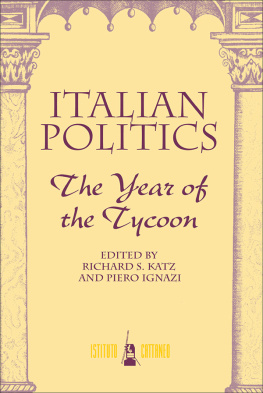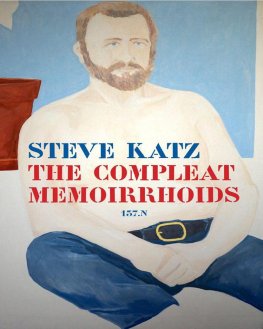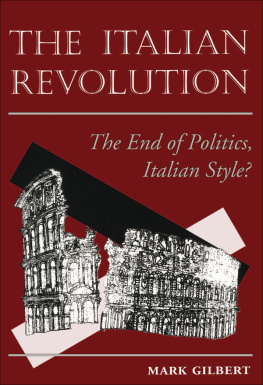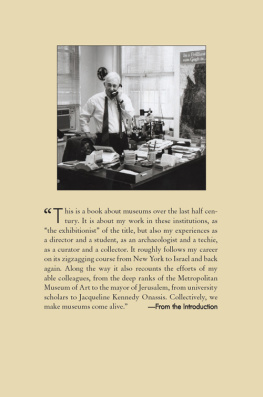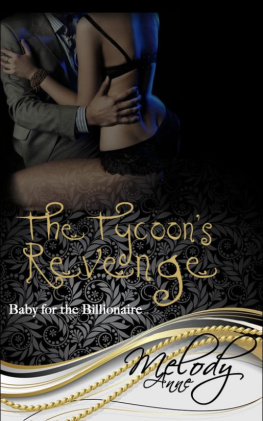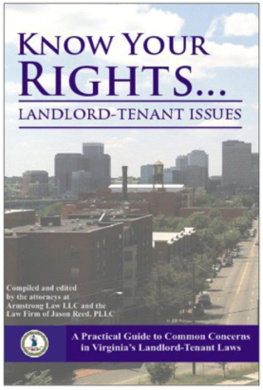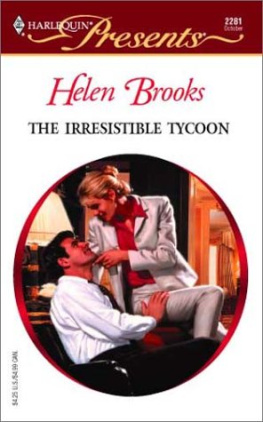Italian Politics: A Review, Volume 10
First published 1996 by Westview Press
Published 2018 by Routledge
2 Park Square, Milton Park, Abingdon, Oxon OX14 4RN
711 Third Avenue, New York, NY 10017, USA
Routledge is an imprint of the Taylor & Francis Group, an informa business
Copyright 1996 Taylor & Francis
All rights reserved. No part of this book may be reprinted or reproduced or utilised in any form or by any electronic, mechanical, or other means, now known or hereafter invented, including photocopying and recording, or in any information storage or retrieval system, without permission in writing from the publishers.
Notice:
Product or corporate names may be trademarks or registered trademarks, and are used only for identification and explanation without intent to infringe.
A CIP catalog for this book is available from the Library of Congress.
ISBN 13: 978-0-8133-2976-5 (pbk)
ISBN 13: 978-0-8133-8972-1 (hbk)
The Istituto Cattaneo, founded in 1965, is a private, nonprofit organization. It aims to promote, finance, and conduct research, studies, and other activities that contribute to the knowledge of contemporary Italian society and, especially, of the Italian political system.
Istituto Carlo Cattaneo, Via Santo Stefano 11, 40125 Bologna, Italy
January
3 Ciampi defends himself against Berlusconis accusation that he raised taxes, reconfirming a 1.2 percent tax cut.
4 At the Cusani trial, Carlo Samas former right hand man, Marcello Portesi, accuses Bossi of having asked for and obtained 200 million lire from Montedison to finance the Northern League.
5 Bossi admits to having contact with Carlo Sama, but denies charges of kickbacks paid by the Leagues ex-treasurer, Alessandro Patelli.
New dissension within the DC: Martinazzoli parts with neo-centrists Mastella, Casini, and DOnofrio, who are accused of having independent contacts with the other parties.
8 Ciampi refuses the resignation of police chief Parisi, accused in the SISDE scandal.
9 A bomb explodes in Rome, in front of the NATO offices in EUR.
10 The Pope appeals for Catholic unity in a letter to Italian bishops.
11 Indro Montanelli, the founder of the Giornale, resigns over political dissension with Berlusconi, the daily papers publisher.
12 Ciampi resigns.
As the judicial year begins, Vittorio Sgroi, Procurator General for the Court of Cassation, criticizes the activism (protagonism) of the Mani pulite judges and the excessive presence of Public Prosecutors in the trials.
13 Carlo Azeglio Ciampi returns his mandate to President Scalfaro, who sets new elections for March 27.
Luigi Abete, president of Confindustria, distances himself from Berlusconi, declaring the business worlds neutrality until the presentation of programs and candidates.
14 Rabbi Toaff, head of the Italian Jewish community, asks Scalfaro to change the date of the March 27 election, which falls on Passover. Negotiations between FIAT and labor leaders over the 1994-96 industrial plan fail.
16 Scalfaro refuses Ciampis resignation.
17 Protests by Jewish citizens are greeted by the government with an exceptional decree which extends the vote to Monday, March 28.
1,800 workers and technicians at FIAT go on unemployment benefits at midnight.
18 The DC is dissolved and two new parties are formed: the Italian Popular Party (PPI), headed by Martinazzoli, and the Christian Democratic Center (CCD), by neo-centrists Casini, DOnofrio, and Mastella.
19 Following the opening of an investigation of Gioia Tauros ENEL plant jobs, top business managers are arrested.
Silvio Berlusconi gives an ultimatum to the moderate forces: if there is no alliance agreement in a week, his entry into politics will be inevitable.
21 Minister of the Interior Nicola Mancino resigns following his direct involvement in the investigations of SISDE slush funds. Ciampi refuses his resignation.
22 Giorgio La Malfa is re-elected secretary of the PRI.
Fausto Bertinotti takes Armando Cossuttas place as secretary of the Communist Refoundation, and MSI secretary Gianfranco Fini launches his National Alliance project, while Martinazzoli illustrates PPI policy by shutting out the PDS and entering into a dialogue with the League.
24 Segni and Maroni initial an accord for an electoral alliance.
26 Silvio Berlusconi resigns as president of Fininvest and announces his plans to enter into politics and form a coalition to oppose the Left. The accord between Segni and the League falls through.
27 The CSM allows certain judges, including Tiziana Parenti of the Mani pulite investigating team, to be candidates in the parliamentary elections.
28 The MSI convention opens and adopts the symbol of the National Alliance for future elections.
30 The PRI is divided over electoral coalitions: with only six no votes, La Malfas proposal of an alliance with Segni and Martinazzoli passes, against those who supported an alliance with the Left.
31 Bossi declares that he is against an accord with the MSI-AN.
February
1 A Progressive electoral accord is formed, including the PDS, the Greens, the Network, Communist Refoundation, AD, PSI, Rinascita Socialista, and the Social Christians.
3 A Doxa poll reveals that 26 percent of Italians consider Berlusconi the most trustworthy man in politics, followed by Ciampi with 10 percent and Occhetto and Segni with 7 percent.
Disagreements over candidacies arise in the newly-formed Progressive line-up: AD and the Greens refuse to participate in the public introduction of the symbol.
4 At the League congress in Bologna, Bossi says yes to an alliance with Forza Italia and no to Fini and Segni.
6 In Rome, Berlusconi announces his principle electoral program based on the fight against unemployment, the reduction of taxes, and laissez-faire economics.
7 Berlusconi and Fini conclude an accord for the nomination of candidates common to Forza Italia and the National Alliance in the Center and the South.
10 Bossi and Berlusconi reach an agreement for common lists in the North.
11 Silvio Berlusconis brother Paolo is arrested on charges that he paid a kickback for the sale of three Milano 3 buildings. By evening, house arrest is granted.
13 Two Italian volunteer workers, Sergio Passadore and Gianfranco Stefani, are kidnapped in Somalia.
16 Massimo DAlema, second-in-charge of the PDS, is included on the list of those being investigated for payments to the ex-PCI, after Craxis denunciation.
17 The Banca dItalia reduces the discount rate by half a point, bringing it to 7.5 percent.
Mario Sarcinelli is named president of the BNL.
19 Achille Occhetto is also listed as being investigated following accusations by Craxi, who himself is accused of slander.
21 FIAT and union leaders sign an agreement allowing early retirement for more than 6,000 workers and unemployment compensation for 4,000.
22 Certain electoral lists are disallowed for irregularities according to the new electoral law: Mario Segnis Pact is excluded from the proportional vote in 8 districts

